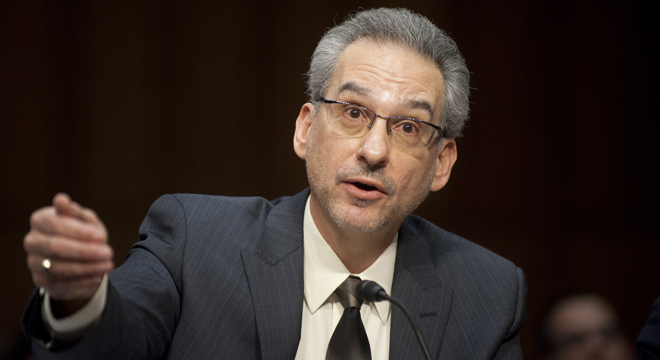The intellectual architect of the legal case against the health care law is declaring victory.
That might sound delusional. The Supreme Court upheld the health care law and yet one of its most dogged critics, and a man with a heavy stake in the outcome, claims he won.
And in a real way he did.
Though Barnett’s policy preferences weren’t vindicated Thursday, the crux of his legal theory is now the law of the land. The case against the healthcare law rested on Barnett’s argument that the Commerce Clause does not empower the government to regulate “inactivity” — Congress can not make idle people enter the health insurance market if they don’t want to enter it.
“It was a stunning victory for the arguments, that had been previously characterized as frivolous, to be adopted by the majority of the Court on the very day that it upholds the Affordable Care Act,” says Georgetown University law professor Randy Barnett.
Although the Court upheld the mandate as an exercise of the taxing power, the five conservative justices, in different opinions, all reached the conclusion that the mandate does not fly on the wings of the Commerce Clause. Which is to say, they bought his activity/inactivity distinction.
“Honestly I never thought [this outcome] was an option,” Barnett said. “If we lost on Obamacare, we’d lose the Constitution, and if we won Obamacare, we’d have to win the Constitution. I didn’t see this as a possibility.”
Barnett is no fan of the rest of the law. He doesn’t simply have a picayune gripe with the technical wording of the mandate’s statutory language. But though the battle over ‘Obamacare’ is now confined to the trickier realm of politics, Barnett views the Court’s holding on the Commerce Clause as more than a consolation. Though the government stressed the uniqueness of the health care market, Barnett worried that if the law had been upheld on Commerce Clause grounds, “Congress could have used the Commerce Clause to pass any economic regulation of its choosing.”
His arguments began to take shape in November 2009 — months before the ACA became law. And though he admits that his case was in some sense constructed with a policy outcome in mind, he brushes off critics who view that as unusual in the world of litigation.
“Litigation arguments develop the way they develop,” Barnett said. “That’s just how things work in litigation. The government was making arguments they’d never thought up before.”
The jury’s still out on the practical implications of the Court’s new position on the Commerce Clause. Because health care is unique, many scholars have a hard time thinking of a major issue that Congress would need to regulate inactivity in order to address. And even if one comes along, the Court painted the way for Congress to achieve the same outcome with the taxing power.
But there’s a hidden upside, as far as Barnett is concerned. Using the taxing power is more politically difficult than using the Commerce Clause, Barnett argues, and people who violate this and future mandates will only be subject to tax penalties — not prison, as they could be under the Commerce Clause.
Many scholars criticized, even mocked, his health care arguments. So it’s no surprise Barnett’s taking a victory lap. But he has kudos for an unlikely constituency. “I think the press coverage of this story has been incredible — it’s been fair, balanced and accurate,” he said.










